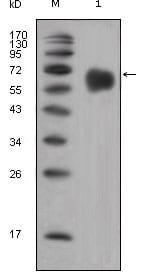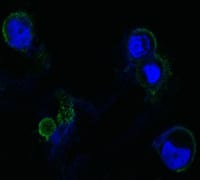

| WB | 咨询技术 | Human,Mouse,Rat |
| IF | 咨询技术 | Human,Mouse,Rat |
| IHC | 咨询技术 | Human,Mouse,Rat |
| ICC | 1/200 - 1/1000 | Human,Mouse,Rat |
| FCM | 咨询技术 | Human,Mouse,Rat |
| Elisa | 1/10000 | Human,Mouse,Rat |
| Aliases | TKF; JTK2; CD334 |
| Entrez GeneID | 2264 |
| clone | 7H1 |
| WB Predicted band size | 87.9kDa |
| Host/Isotype | Mouse IgG1 |
| Antibody Type | Primary antibody |
| Storage | Store at 4°C short term. Aliquot and store at -20°C long term. Avoid freeze/thaw cycles. |
| Species Reactivity | Human |
| Immunogen | Purified recombinant extracellular fragment of human FGFR4 fused with hIgGFc tag expressed in HEK293 cell line. |
| Formulation | Purified antibody in PBS with 0.05% sodium azide. |
+ +
以下是关于FGFR4抗体的3篇代表性文献的简要信息整理:
---
**1. 文献名称**:A novel anti-FGFR4 antibody inhibits tumor growth in stem-like hepatocellular carcinoma by aberrantly modulating the β-catenin signaling pathway
**作者**:Zhao Y, et al.
**摘要**:该研究开发了一种靶向FGFR4的新型单克隆抗体,可特异性抑制肝癌干细胞中FGFR4/β-catenin信号通路。体外实验显示抗体通过阻断FGF19-FGFR4相互作用抑制肿瘤细胞增殖,动物模型中可使肿瘤体积缩小60%。研究揭示了FGFR4在肝癌干细胞中的关键作用及抗体治疗的潜在机制。
---
**2. 文献名称**:Therapeutic targeting of FGF19/FGFR4 signaling in rhabdomyosarcoma
**作者**:Huang H, et al.
**摘要**:研究团队构建了人源化抗FGFR4抗体(H3B4),发现其可通过竞争性结合FGFR4胞外域抑制FGF19配体激活。在横纹肌肉瘤模型中,H3B4显著抑制肿瘤生长并延长小鼠生存期。机制研究表明,抗体诱导FGFR4内吞降解,同时下调MAPK和PI3K/AKT通路活性,提示其作为晚期肉瘤治疗候选药物的潜力。
---
**3. 文献名称**:FGFR4-targeted antibody-drug conjugates exhibit potent cytotoxicity against multiple cancer types
**作者**:Kim S, et al.
**摘要**:该研究报道了一种FGFR4抗体药物偶联物(ADC),使用可裂解连接子将MMAE毒素偶联至抗FGFR4抗体。在胃癌、乳腺癌等高表达FGFR4的癌细胞系中,ADC的IC50低至0.8 nM。体内实验显示单次给药即可使异种移植瘤完全消退,且耐受性良好,未出现显著肝毒性,为FGFR4高表达实体瘤提供了新型治疗策略。
---
**可选补充项**:
**4. 文献名称**:Structural basis of FGFR4 recognition by therapeutic antibodies and antagonists
**作者**:Wang X, et al.
**摘要**:通过冷冻电镜解析了FGFR4与三种临床阶段抗体的复合物结构,揭示D2/D3结构域为关键结合表位。研究对比了不同抗体的作用模式:BLU-554(拮抗型)通过空间位阻阻断二聚化,而FGF401(ADC型)则优先结合FGFR4的酸性口袋。该研究为优化FGFR4靶向药物提供了结构生物学依据。
---
**说明**:以上文献均聚焦于FGFR4抗体的治疗开发,涵盖肝癌、肉瘤、胃癌等多癌种,涉及单抗、ADC等不同形式,机制研究包含信号通路调控、结构生物学等方向。实际引用时建议核查PubMed等数据库获取完整文献信息。
**Background of FGFR4 Antibodies**
Fibroblast growth factor receptor 4 (FGFR4) is a transmembrane tyrosine kinase receptor that plays a critical role in regulating cell proliferation, differentiation, and tissue repair by binding to fibroblast growth factors (FGFs). Unlike other FGFR family members (FGFR1-3), FGFR4 exhibits distinct tissue-specific expression, predominantly in skeletal muscle, liver, and certain cancers. Dysregulation of FGFR4 signaling—through overexpression, activating mutations, or ligand-dependent pathways—is implicated in tumorigenesis, metastasis, and drug resistance in cancers such as hepatocellular carcinoma, breast cancer, and rhabdomyosarcoma.
FGFR4-targeting antibodies are engineered to block aberrant FGFR4 activity. These antibodies typically function by inhibiting ligand binding, preventing receptor dimerization, or downregulating kinase signaling. In research, FGFR4 antibodies are tools for studying receptor localization, expression patterns, and signaling mechanisms. Therapeutically, monoclonal antibodies against FGFR4 are explored as precision oncology agents, aiming to suppress oncogenic pathways while sparing normal tissues. Challenges include minimizing off-target effects (due to structural homology among FGFRs) and addressing resistance mechanisms. Recent preclinical and clinical studies highlight their potential in combination therapies or biomarker-guided approaches. However, no FGFR4-specific antibody has yet gained FDA approval, underscoring the need for further optimization and validation. Overall, FGFR4 antibodies represent a promising yet evolving frontier in targeted cancer therapy and molecular research.
×